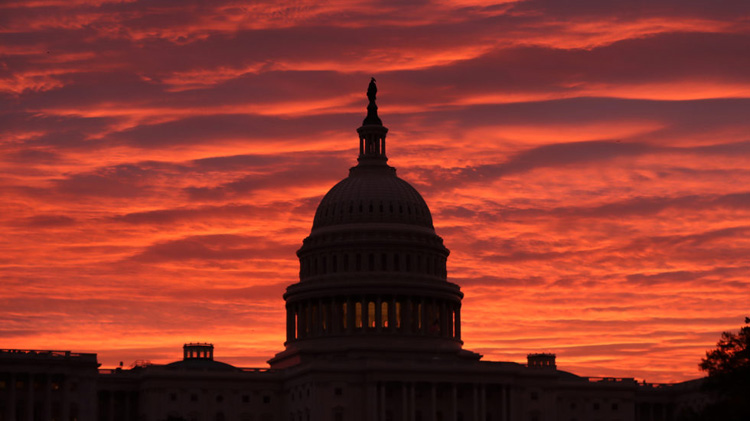 |
|---|
| The sky turns to a fiery color as the sun begins to rise behind the U.S. Capitol building, on November 7, 2019 in Washington, DC. |
 
|
SCOTUS Upholds Oregon Ban on Homeless Use of Pillows, Blankets
Law & Crime
Fri June 28, 2024
Area: Medford, Klamath Falls
The United States Supreme Court ruled Friday that bans criminalizing the use of blankets, pillows, or cardboard boxes while sleeping on public property do not offend the Eighth Amendment’s restriction on cruel and unusual punishment.
Like many cities throughout the country, the city of Grants Pass, Oregon has a “camping ban.” Grants Pass has a population of approximately 38,000 people, with a daily average of about 600 people experiencing homelessness. A city ordinance bars the use of blankets, pillows, and cardboard boxes while sleeping within the city on public property and imposes a fine of $295 for violations with related nonpayment penalties including a fine of $1,250 and 30 days in jail.
Relevant to the issue of the ordinance’s legality is the 1962 Supreme Court ruling in Robinson v. California, in which the Court held that the Eighth Amendment’s ban on cruel and unusual punishment makes it illegal to criminalize the status of being a drug addict. Challengers to the Grants Pass ordinance argued that it similarly aimed to criminalize a person’s status.
The litigants did not challenge other restrictions such as prohibitions on tents or other camping gear.
A majority of the justices disagreed with the Ninth Circuit and ruled that the Grants Pass laws did not offend the Eighth Amendment. Gorsuch reasoned that cities use all sorts of responses to combat the “varied and complex” problem of homelessness. Individuals find themselves lacking shelter for myriad reasons and experience different effects, the justice explained. As communities grapple with crafting effective solutions, camping bans are just one in a larger set of tools that municipalities choose to employ to combat a growing problem.
“Under the city’s laws, it makes no difference whether the charged defendant is homeless, a backpacker on vacation passing through town, or a student who abandons his dorm room to camp out in protest on the lawn of a municipal building,” Gorsuch argued as proof that the laws were truly about actions as opposed to status.
Justice Sonia Sotomayor was unconvinced. Over 30 pages, Sotomayor, joined by Justices Elena Kagan and Ketanji Brown Jackson, vehemently dissented from the majority’s ruling.
She began with a statement of what exactly she thinks is at stake in Grants Pass:
"Sleep is a biological necessity, not a crime. For some people, sleeping outside is their only option. The City of Grants Pass jails and fines those people for sleeping anywhere in public at any time, including in their cars, if they use as little as a blanket to keep warm or a rolled-up shirt as a pillow. For people with no access to shelter, that punishes them for being homeless. That is unconscionable and unconstitutional. Punishing people for their status is “cruel and unusual” under the Eighth Amendment."
Sotomayor said that, “the majority focuses almost exclusively on the needs of local governments,” instead of balancing the interests of government and the interests of protecting the most vulnerable in our society. She also called out the majority for “fail[ing] to engage seriously with the precipitating causes of homelessness, the damaging effects of criminalization, and the myriad legitimate reasons people may lack or decline shelter.” The justice went on to give numerous facts, statistics, and background details about homelessness and its causes.
The justice argued that the Eighth Amendment does “is not limited to medieval tortures,” but also limits the power of those entrusted with the power to enforce criminal laws more generally. The amendment not only limits the punishments, but also imposes substantive limits on what can be made criminal, Sotomayor argued.
Further, Sotomayor refused to accept the majority’s premise that it was not criminalizing the “status” of being homeless.
“For someone with no available shelter, the only way to comply with the Ordinances is to leave Grants Pass altogether,” she pointed out, then noted that the Grants Pass City Council even admitted in a meeting that the ordinances were intended to criminalize homelessness generally.
“The idea was deterrence, not altruism,” she summarized.
Sotomayor wrote that by Gorsuch’s logic, the ordinance at issue in the Robinson case would have been constitutional if instead of criminalizing “being an addict,” it prohibited, “being an addict and breathing.”
Sotomayor remind that the Robinson Court itself explained, “Even one day in prison would be a cruel and unusual punishment for the ‘crime’ of having a common cold,” then wrote, “According to the majority, although it is cruel and unusual to punish someone for having a common cold, it is not cruel and unusual to punish them for sniffling or coughing because of that cold.”
The justice also provided some context for the way entities other than Grants Pass have used legislation to combat homelessness. The Federal Government and many states have taken the position that they can address homelessness without prohibiting sleeping in public as a general matter.
The justice concluded by saying that Oregon’s laws not only violated the Eighth Amendment, but may also violate the Due Process Clause as well as other legal requirements.
“I remain hopeful that someday in the near future, this Court will play its role in safeguarding constitutional liberties for the most vulnerable among us,” wrote Sotomayor. “Because the Court today abdicates that role, I respectfully dissent.”
Justice Clarence Thomas joined the Court’s majority, but also penned his own brief concurrence to say that he thought Robinson was wrongly decided, because the text and history of the Eighth Amendment does not foreclose the concept of criminalizing a person’s status. Thomas said that the Robinson court “made no attempt” to do a thorough analysis of the Eighth Amendment’s requirements and that therefore its holding is incorrect.
You can read the Court’s full opinion here.


 Share your thoughts in the Forum
Share your thoughts in the Forum
